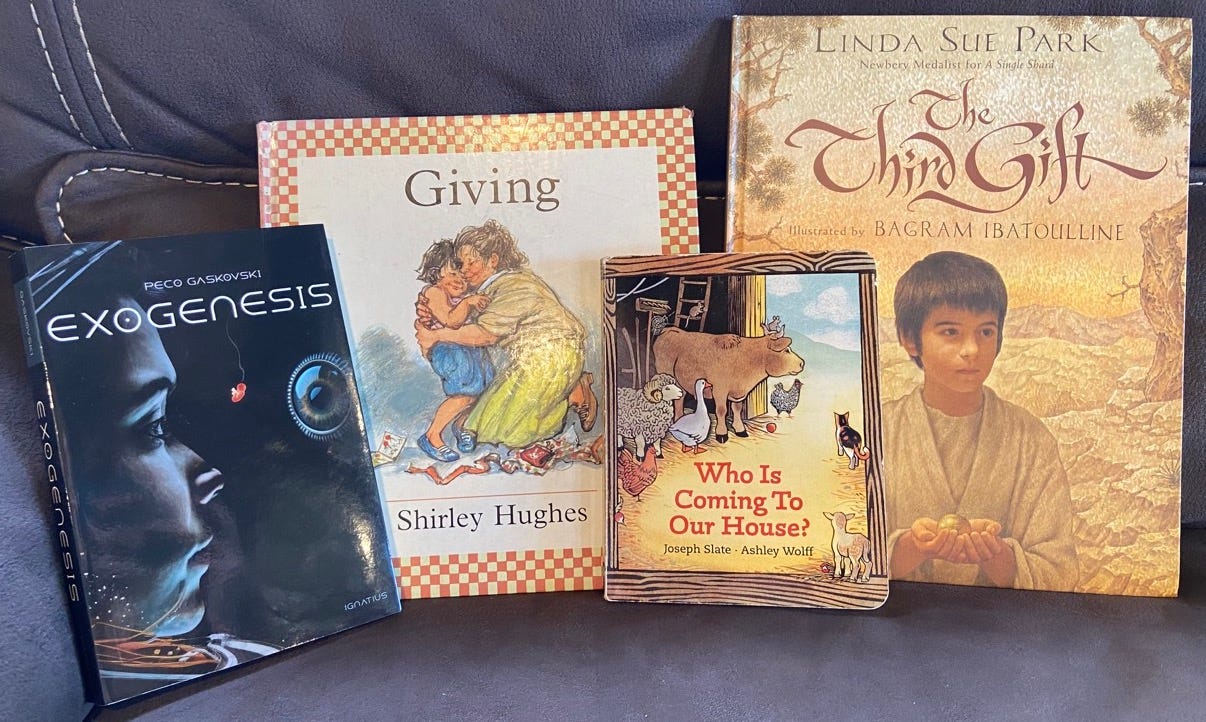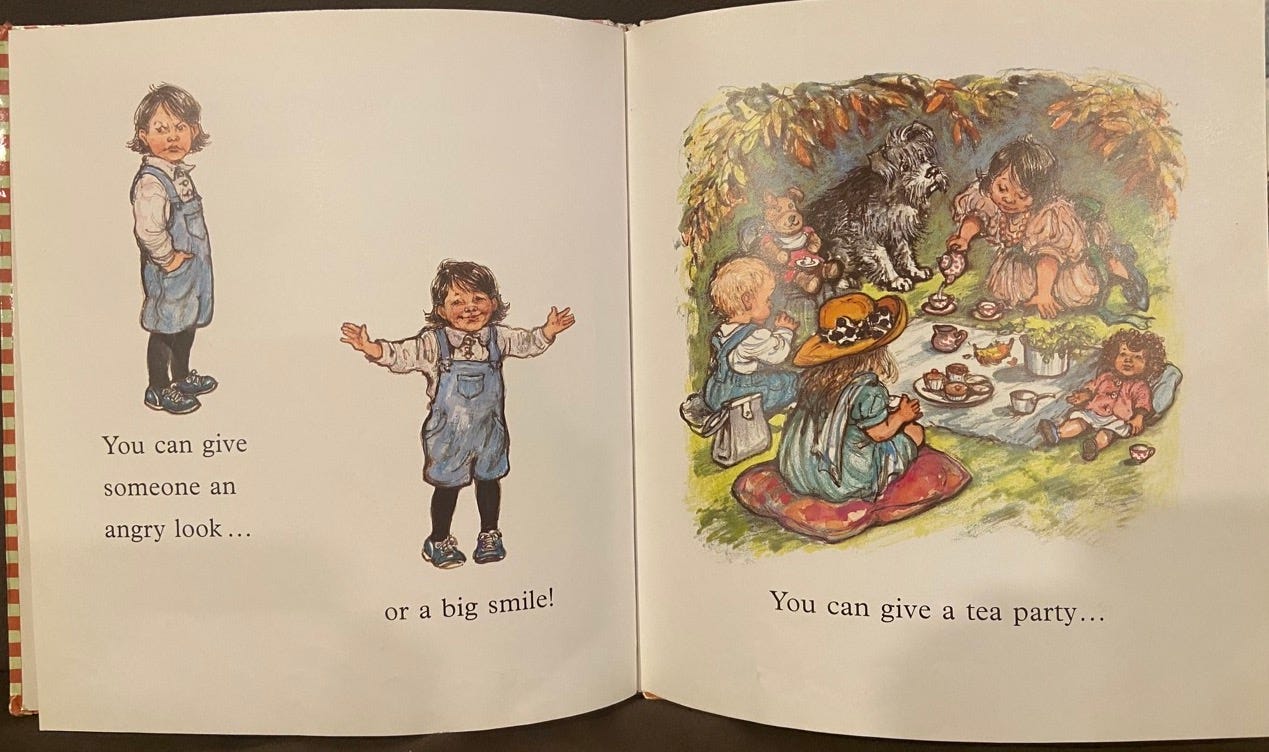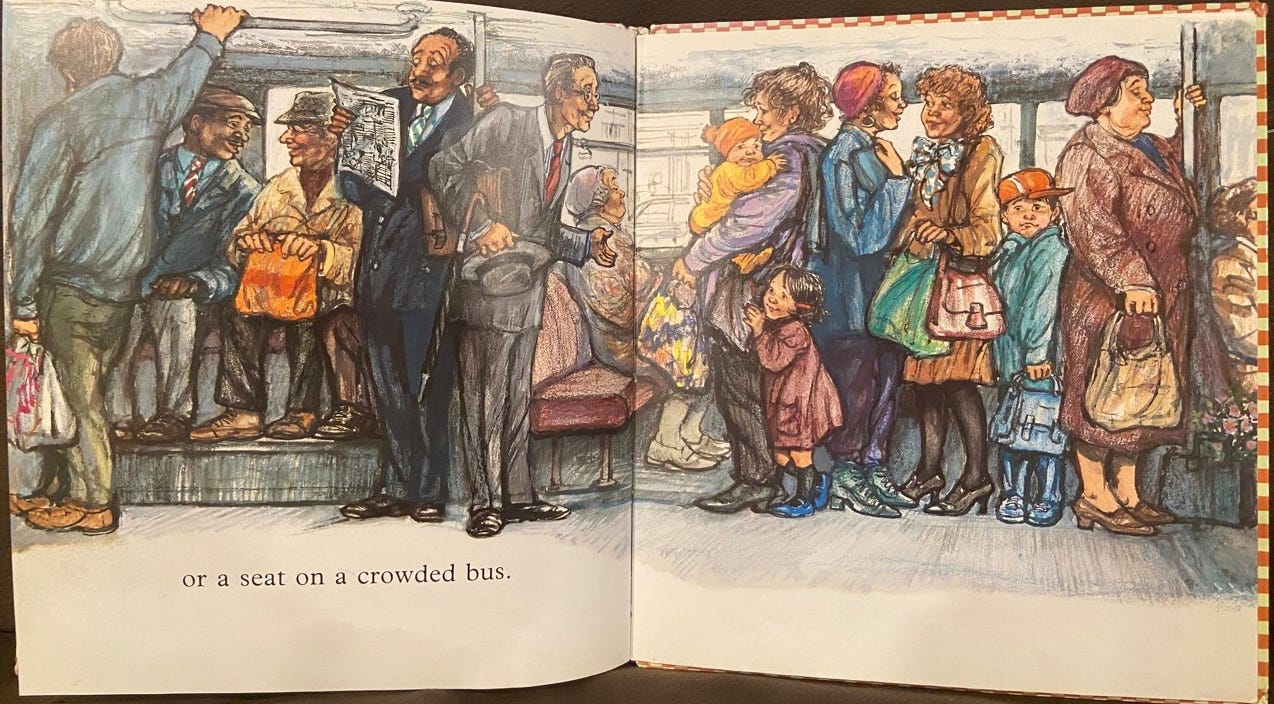Reading by Firelight, ed. 1
An introduction, and stories to share at the turning of the year
I mentioned briefly in my previous piece that one of my family’s favorite ways to celebrate the full Twelve Days of Christmas (beginning Dec. 25) is to open gifts across the course of all twelve days — and this is made possible in large part by the gift exchange that we do with a group of family friends. The husbands and fathers of this group all attended graduate school together, but our families are now dispersed across the country, so our gift exchange has been a lovely way to keep us all connected, even when we aren’t able to see each other in person often. Though I have wished I had the creativity and skills that my friends contribute to our shared tradition,1 I’ve come to embrace my role as the “auntie” who gifts books. It’s such a joy to share my family’s favorite stories each year, knowing that these stories will draw us all closer together, and fervently hoping that they will inspire us to live out the virtues that the books’ characters display. This joy mirrors the joy that my family experiences when we receive the latest stories sent by my oldest son’s godmother, whose practice of gifting books has enriched my family immeasurably.2
I envision my new “Reading by Firelight” series as an extension of this gift-giving tradition. While there are many great booklists available, and countless people working to provide book reviews and recommendations on a more frequent basis than I can manage, I believe there’s something special about receiving a few treasured stories from someone who’s striving to help you and your family grow in virtue and togetherness. Unfortunately, I can’t share a copy of my favorite stories with each of my readers, as I’ve grudgingly accepted that my book budget is limited. However, I’m excited to share my short explanations of why certain stories have particularly helped me and my family as we learn to live rich, meaningful, human lives, rather than lives centered around digital technology.3
One final note before we dig into the books of the first edition: I’ll be focusing primarily on children’s books, partially because I think it’s so important for all of us to share truly high quality books with the children in our lives, and partially because I believe that truly great children’s books enrich adult readers as much as younger listeners.4 However, I’ll be endeavoring to include one book specifically for adult (or older teenage) readers in each edition of “Reading by Firelight” as well. I hope all my readers will pick up these books rather than their devices, and savor the quiet moments of their lives, rather than filling them with so much digital noise.

Giving by Shirley Hughes
So much of our world today operates on the premise that the only things worth paying attention to are flashy, exciting, or somehow “cutting edge.” The work of prolific author and illustrator Shirley Hughes, whose final book was published in late 2020, stands in stark contrast to this premise. Hughes principally concerned herself with what could be derided as “ordinary” — and yet, for so many people, the family and community life that she depicts is anything but. For example, the first Shirley Hughes book that my family read was Alfie Gets in First, in which the titular little boy, Alfie, unwittingly locks himself in his family’s home, leaving his mother and little sister out on the front stoop. What’s remarkable about this book is how a full cast of characters jumps in to help with the situation — the neighbor girl who sometimes babysits Alfie, “Alfie’s very good friend the milkman,” and several others ultimately lend their support, and join the family for an impromptu celebration in the end. Hughes’s work consistently celebrated the incredible importance of relationships, and her depictions of the bonds between siblings are particularly touching (e.g., Dogger or Annie Rose Is My Little Sister). Her lovingly crafted illustrations make her overall work even more delightful, and perfect for young children to look at themselves while their parents are otherwise occupied.
I ultimately chose to feature Giving in this first edition of “Reading by Firelight” because I love Hughes’s perspective on a word that can be overly associated with presents or material things, especially at this time of year. The book does include the giving of presents, but expands the concept in a way that is concrete enough for even young children to understand. It’s also shorter than many of Hughes’s other books, so it’s perfect for short attention spans or busy times of year (like now). May we all take a few minutes to remind ourselves that giving doesn’t actually need to cost us anything.
Who Is Coming To Our House? by Joseph Slate
There are so many things to love about this little Christmas board book. The illustrations express a gentle reverence, the text follows a lovely cadence with rhyming that’s never forced, and baby Jesus and his parents actually play a prominent role in the story. I especially appreciate that this book feels appropriate for Advent, too, as much of it focuses on preparing for the arrival of baby Jesus. I’ve even found myself reflecting on how the book emphasizes the importance of embodied hospitality (yes, I was serious when I said children’s books are for adults too). The other “Christmas” board books that we have are often forgotten on a shelf shortly after we take them out for the season (I’m looking at you, Clifford’s First Christmas), but we pull this book off the shelf again and again, and I just found my 18 month-old gazing at the illustrations all by himself while I was bathing his older siblings. Overall, this book is a very worthy addition to the home library of any family with young children.
The Third Gift by Linda Sue Park
Many of us are used to seeing the “wise men” with their gifts as part of Nativity scenes, and we might recognize the song “We Three Kings,” but there is a remarkable dearth of books that actually explore the festival of Epiphany, which is observed immediately following the Twelve Days of Christmas (January 6 in the Western Christian tradition). However, I’ll take quality over quantity any day, and Linda Sue Park’s The Third Gift is certainly a book of very high quality. Park tells the story from a completely different angle than we’re used to, and I love how she portrays the dynamic of the father and son around whom the story revolves. Park makes the son her narrator, and his explanation of what myrrh actually is and what it was used for in ancient times is woven very naturally into the story. This explanation enables the reader to understand how profoundly significant it is that the Magi presented myrrh to Jesus as a very young child. The incredible illustrations also evoke the same sense of wonder inspired by the text. There aren’t many stories that my family reads every year without fail, but The Third Gift is a book we never miss, and I encourage you to read it with your family this Epiphany.
Exogenesis by Gaskovski
I know it’s easy for me, at least, to fall into the habit of prioritizing nonfiction books for my own reading. Though I would never say that fiction is for children, there are simply so many “actionable insights” and so much “strategic wisdom” that I expect to get out of the thick, often dense nonfiction books that I truly do want to read.5 And yet, stories are integral to how we humans make sense of the world. Far from mere entertainment, truly well-crafted stories engage our imaginations to help us more deeply contemplate the most important questions that we face. Exogenesis has all the hallmarks of a truly well-crafted story: its characters are carefully developed and multi-dimensional, its plot never feels stale or predictable, and its prose is so smooth and effortless to read that I devoured its 331 pages in two nights. But it is so much more than a suspenseful, gripping page-turner of a story; it left me truly moved.
The novel’s protagonist and narrator, Maelin, finds herself straddling two worlds that bear a striking resemblance to the two visions for human life that are currently vying for primacy in our society. As a citizen of sprawling Lantua City, Maelin is accustomed to a large degree of algorithmic influence on her life — her status quo doesn’t feel that far removed from what Freya India has recently described:
“We [in Gen Z] didn’t just grow up with algorithms. They raised us. They rearranged our faces. Shaped our identities. … So what chance does the next generation stand? … [For those in Generation Alpha (born after 2010),] Every aspect of their lives—from how they look to how they feel to what they believe—will be guided by algorithms from the very start.”6
However, as a rare Lantuan whose career often takes her out of the city and into the remote northern territories, Maelin is intimately familiar with the freedom that the techno-metropolis can’t offer — and significantly, this isn’t simply personal freedom, but freedom from coercion in our most fundamental, even primal relationships (as the title of the novel alludes to).
I think the genius of Exogenesis lies in how Gaskovski brings us along with Maelin as circumstances beyond her control force her to grapple with what she truly believes is best for people — and to take action accordingly. It’s so easy to avoid this grappling in our own lives, amidst the busyness, simple logistics, and digital noise, but Gaskovski masterfully compels us to join Maelin in her search for answers. We learn, with Maelin, that by being honest with ourselves and truly engaging in conversations and relationships with others, we can resist the pull of the technological status quo, and choose a different path — not just in a singular revelation, but through a series of “acts of resistance.” I have to admit, I was skeptical that a dystopian novel could be hopeful, as the reviews of Exogenesis claimed — and yet, through these many subtle invitations to make our own choices, Gaskovski has created a story studded with hope throughout. Though we may have a variety of “supercomputers pointed at our brains,” as Tristan Harris often reminds us, we have the power to resist and refuse their control — together.
If you haven’t yet read Exogenesis, I encourage you to grab a copy now (if you find yourself the recipient of an Amazon gift card, it’s available there too). The Twelve Days of Christmas is a perfect timeframe to read it because you might find yourself unable to put the book down, as I did — and reading into the wee hours of the night won’t matter as much when everyone’s normal schedule is turned upside-down anyway. If buying a copy isn’t in your budget, consider requesting that your library purchase it. And if you’ve already read your own copy, share it with a friend or family member!7
One final note
Thank you so much to everyone who has encouraged me in my efforts here at Digital with Discernment. Early in 2023 I decided that the perfect time to write would never come, and that regardless of how utterly overwhelming the topic seemed, I needed to join the voices challenging our society’s new digital status quo. I never imagined that with just a handful of pieces and my faltering efforts, so many people would sign up to read what I have to say — and yet, here we are. I’m incredibly excited to continue this journey with you in 2024, and I wish you a final week of 2023 that’s full of genuine connection, true rest, and the makings of many wonderful shared stories.
For example, the sewing skills that one of my friends has used to make gorgeous Christmas and Epiphany dolls for all our families, a few at a time, over several years.
In fact, two of the books in this edition of “Reading by Firelight” were gifts from my oldest son’s godmother, and one is by an author she introduced us to. If she starts a Substack of her own, as I hope she does, I’ll be sure to share it here!
The title of the series, “Reading by Firelight,” is an allusion to the “fire of Iolaus” that I discussed in my previous piece, “Hercules, the Hydra, and the Holidays”. I encourage you to read the full piece, but briefly, I defined the “fire of Iolaus” as “intentional, persistent effort to teach ourselves and our children that a rich, meaningful, human life is not centered around digital technology — but rather relationships with people in which we are truly known and loved.” This “fire of Iolaus” is one of two totally different but complementary approaches that are needed to fight the “hydra of digital and electronic technology harms,” and I posit that sharing stories is one way we can “wield the flame.”
Not to mention that children’s books comprise the bulk of the reading I’ve done over the past several years.
I’ve tried very hard to break myself of using “consultant speak,” but phrases like these still come to my mind occasionally. I use them here for ironic emphasis.
I encourage you to read the powerful full piece, “Algorithms Hijacked My Generation. I Fear For Gen Alpha.”
The tradition of sharing stories doesn’t have to include parting with your copy forever — I speak from experience, as I’m also developing a habit of sending my sister back home with books from my home library when she visits from out of state. Of course, you could certainly order yourself another copy!




Thanks for the mention, Kaitlyn, and your thoughtful analysis of Exogenesis! You captured it better than I could!
Other sci-fi/dystopian fiction (by other authors) that readers might like are The Circle by Dave Eggers, and A Canticle for Leibowitz by Walter M. Miller Jr. They are not entirely hopeful in the end, but do powerfully express various “Machine” themes.
I appreciate your stack and these book recs. Exogenesis will be my first book of the New Year (after starting to re-read the Bible of course). Also, I had to look up Epiphany doll. Would love to see a pic of this handcrafted art. Merry Christmas!